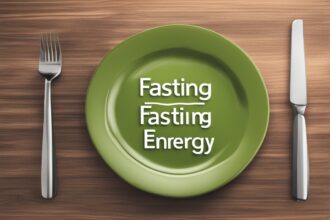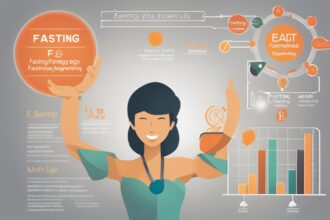Hey there, health enthusiasts! If you’ve ever wondered how skipping a meal or two could possibly make you feel more energized, you’re in for a treat. Today, we’re diving deep into the fascinating world of fasting and energy, exploring the incredible fasting benefits that can transform not just your body, but your entire sense of vitality. fasting isn’t just a trend—it’s a practice rooted in history and backed by modern science. Whether you’re a seasoned faster or just curious about intermittent fasting benefits, this guide will break down how fasting can boost your energy, improve mental clarity, and even support long-term health. Let’s unpack the science, bust some myths, and share actionable tips to help you harness the power of fasting for energy like never before.
What Is fasting, and How Does It Relate to Energy?
fasting, at its core, is the voluntary abstinence from food and sometimes drink for a specific period. From religious traditions to modern health protocols like intermittent fasting, this practice has been around for centuries. But how does it tie into energy? When you fast, your body shifts gears. Instead of relying on the immediate fuel from your last meal, it taps into stored energy reserves like glycogen and fat. This metabolic switch can lead to a surprising surge in energy for many people, as the body becomes more efficient at burning fuel. Research shows that fasting can enhance mitochondrial function—the powerhouse of your cells—potentially leading to improved energy production (Anton et al., 2018). So, while it might sound counterintuitive, not eating can actually make you feel more alive, and that’s just one of the many fasting benefits we’ll explore.
The Science Behind Fasting Benefits for Energy
Let’s get nerdy for a moment and talk about what’s happening inside your body during a fast. When you stop eating, your insulin levels drop, and your body begins to break down stored glycogen for energy. After about 12–16 hours, depending on your activity level, it often shifts to ketosis, where it burns fat for fuel, producing ketones. Ketones are not just an alternative energy source; they’re incredibly efficient, especially for your brain, leading to heightened focus and mental energy (Paoli et al., 2019). Studies also suggest that fasting triggers autophagy, a cellular cleanup process that removes damaged components and may boost overall energy by optimizing cell function (Bagherniya et al., 2018). These fasting health benefits aren’t just hype—they’re grounded in how our biology adapts to periods of scarcity, making us more resilient and energetic over time.
Common Energy Boosts People Experience with Fasting
One of the most talked-about fasting benefits is the unexpected energy boost. But what does that actually feel like? Many fasters report a sense of lightness—no more post-meal sluggishness or sugar crashes. Instead, they describe sustained energy throughout the day, often without the need for constant snacking. Here are some specific ways fasting might rev up your engine:
- Improved Mental Clarity: As your body enters ketosis, ketones fuel your brain, often leading to sharper focus and less brain fog (Veech, 2014).
- Stable Blood Sugar: Fasting helps regulate insulin, preventing the energy dips associated with blood sugar spikes.
- Reduced Inflammation: Lower inflammation from fasting can alleviate physical fatigue, leaving you feeling more vibrant (Faris et al., 2012).
- Better Sleep Quality: Many fasters notice improved sleep patterns, which directly translate to higher daytime energy.
Of course, everyone’s body reacts differently, and the first few fasts might come with an adjustment period. But once you get past the initial hunger pangs, the energy benefits of fasting often shine through.
Potential Challenges: Why Fasting Might Drain Energy Initially
Let’s keep it real—fasting isn’t always a straight path to boundless energy. Especially if you’re new to it, you might feel tired, irritable, or even dizzy in the beginning. This is often due to your body adapting to a new fuel source or mild dehydration since food provides a lot of our daily water intake. Low electrolytes, like sodium and potassium, can also play a role in feeling drained. The good news? These hiccups are usually temporary. Studies indicate that most people adapt to fasting within a week or two, after which energy levels often rebound stronger than ever (Johnstone, 2015). Understanding these challenges is key to sticking with fasting and reaping its long-term energy benefits of fasting.
Practical Tips to Maximize Energy During Fasting
Ready to try fasting and boost your energy? I’ve got you covered with some practical strategies to make the process smoother and more effective. Fasting doesn’t have to be hard, and with the right approach, you can enhance those intermittent fasting benefits for energy. Here are my top tips:
- Stay Hydrated: Drink plenty of water during your fasting window—dehydration is a common energy zapper.
- Balance Electrolytes: Add a pinch of Himalayan salt to your water or sip on bone broth during eating windows to maintain sodium levels.
- Start Slow: If you’re new, try a 12:12 fasting schedule (12 hours fasting, 12 hours eating) before jumping into longer fasts like 16:8.
- Listen to Your Body: If you feel overly fatigued, don’t push it—break your fast with a nutrient-dense meal.
- Time Your Workouts: Exercise during your eating window or toward the end of your fast to avoid feeling too drained.
These small tweaks can make a huge difference in how you feel while fasting, helping you tap into the fasting benefits without the unnecessary struggle.
Who Should Be Cautious with Fasting for Energy?
While the fasting health benefits are impressive, this practice isn’t a one-size-fits-all solution. Certain groups should approach fasting with caution or avoid it altogether. If you have a medical condition like diabetes, are pregnant or breastfeeding, or have a history of eating disorders, fasting could do more harm than good. Even healthy individuals should consult a healthcare provider before starting, especially for extended fasts beyond 24 hours. Research highlights that improper fasting can lead to fatigue or nutrient deficiencies if not done mindfully (Trepanowski & Bloomer, 2010). So, while the energy benefits of fasting are real, they come with a caveat: know your limits and prioritize safety.
In wrapping up, fasting offers a powerful way to boost your energy and unlock a host of fasting benefits that go beyond just feeling more awake. From improved mental clarity to stable blood sugar and cellular repair, the science backs up what many fasters already know—there’s something special about giving your body a break from constant digestion. That said, it’s not without its challenges, and the key to success lies in starting slow, staying hydrated, and listening to your body. Whether you’re curious about intermittent fasting or considering a longer fast, remember that the goal is sustainable health, not perfection. So, why not give it a try? Experiment with a short fast and see how your energy transforms. I’d love to hear about your experiences—drop a comment below and let’s keep this conversation going!
References
- Anton, S. D., Moehl, K., Donahoo, W. T., Marosi, K., Lee, S. A., Mainous, A. G., … & Mattson, M. P. (2018). Flipping the metabolic switch: Understanding and applying the health benefits of fasting. Obesity, 26(2), 254-268.
- Bagherniya, M., Butler, A. E., Barreto, G. E., & Sahebkar, A. (2018). The effect of fasting or calorie restriction on autophagy induction: A review of the literature. Ageing Research Reviews, 47, 183-197.
- Faris, M. A., Kacimi, S., Al-Kurd, R. A., Fararjeh, M. A., Bustanji, Y. K., Mohammad, M. K., & Salem, M. L. (2012). Intermittent fasting during Ramadan attenuates proinflammatory cytokines and immune cells in healthy subjects. Nutrition Research, 32(12), 947-955.
- Johnstone, A. (2015). Fasting for weight loss: An effective strategy or latest dieting trend? International Journal of Obesity, 39(5), 727-733.
- Paoli, A., Bosco, G., Camporesi, E. M., & Mangar, D. (2019). Ketosis, ketogenic diet and food intake control: A complex relationship. Frontiers in Psychology, 10, 27.
- Veech, R. L. (2014). Ketone ester effects on metabolism and transcription. Journal of Lipid Research, 55(10), 2004-2006.






